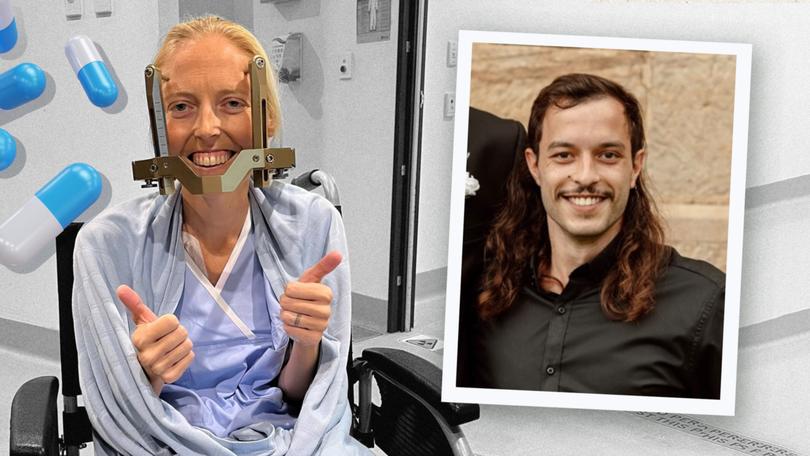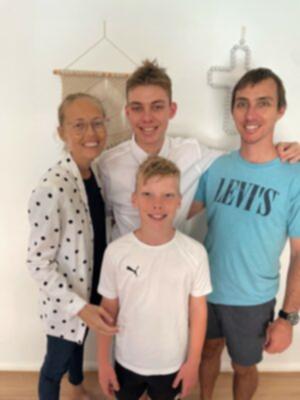MICHAEL USHER: What price do we put on the lives of cancer patients afflicted with Von Hippel-Lindau disease?
MICHAEL USHER: There is a very rare type of cancer that ravages the bodies of those stricken with it, as well as their families. These people are asking for one small thing to make their lives worth living.

I just spent a fascinating morning in Parliament House watching how politics actually works. Made more interesting because that morning was also filled with drama.
Right outside our window, pro-Palestine protesters scaled the facade of our great house of democracy to make their point. Inside, as we watched on with curiosity, a group of us was trying to make our point about a very rare cancer. A panel of patients and medical experts organised by Neuroendocrine Cancer Australia, which I support. This is lobbying at its very best. Trying to wrangle politicians and hope they get them on board to help stop a small group of Australians suffer any more than they already do. Because there’s a very expensive drug that will do this, but our pollies need to endorse it first for consideration on the Pharmaceutical Benefits Scheme.
Because of a very cruel gene mutation, there is a small group of Australian families cursed with a cancer that ravages their bodies. It can affect generations of the one family. Dismissed in previous generations as an illness inflicted during childbirth, or older age, or mystery conditions in young children, these are now known to be one cancer. It’s called Von Hippel-Lindau disease, often shortened to VHL. And it’s the most aggressive of conditions. Tumours grow and spread uncontrollably, attacking any organ in its path. They explode in the brain, they destroy optic nerves robbing eyesight, they ruin kidneys and leave some paralysed. And in the patients I know all of this can happen to one person.
Sign up to The Nightly's newsletters.
Get the first look at the digital newspaper, curated daily stories and breaking headlines delivered to your inbox.
By continuing you agree to our Terms and Privacy Policy.Amelia Ramsay is fragile thin with the kindest smile, who saves the strength she has left to wrap loving, protecting arms around her two boys. Ask her how many surgeries she’s had fighting this disease, and it’d be quicker for her to describe where VHL hasn’t attacked her body. But in short, the tumours have taken her kidneys, caused retinal angiomas in her eyes, required seven brain surgeries, taken over her spine with six removed along her back, triggered intestinal failure and manifested as neuroendocrine cancer on her pancreas.
Her grandmother, mother and two sisters were all lost to this disease. And she now knows both her and her young sons have been diagnosed with VHL. For Amelia and all she’s suffered, this is what causes the most heartbreak. The prospect of her sons suffering the relentless surgeries where she says “every time you lose a bit more of yourself”.

So there Amelia was sitting with me in Parliament House, using every bit of energy she could save, to fight for her boys — and all the hidden patients of this disease. I say hidden, because that’s how they feel. These patients suffer cancers that don’t get a lot of support or attention, don’t get celebrity support, don’t make headlines or attract charity gala dinners. The patients really do suffer in silence and usually suffer misdiagnosis. Neuroendocrine tumours are the most misdiagnosed cancers in Australia, but are our seventh most common cancer. The symptoms can be tricky and doctors often think they’re other conditions. This can lead to misdiagnosis as anxiety, menopause, diabetes and irritable bowel syndrome.
But back to Amelia. There she was on stage with me, so nervous, but determined to make the room of politicians and their advisers hear her message about a new drug that might help her but will almost certainly save her boys suffering the medical torture she’s had to endure. The drug is called Belzutifan. American VHL patients are already on it. It shrinks these particular tumours, and that’s a proven medical fact. It limits punishing surgeries, which will prevent patients being blinded or paralysed. It would have certainly saved Amelia’s kidneys. This is the future Amelia wants to protect her son’s experiencing.
Belzutifan, however, is crazy expensive at $12,000 a month. If it was on the PBS here in Australia, it would cost between $7.50 and $35.00 a month. It’s a ridiculous scenario, but that’s the way big pharmaceuticals work. Amelia’s heartfelt pitch to the politicians was also practical. Yes, it’s a lot for the Government to subsidise, but weigh it up against the financial burden she’s already been on the hospital system. Millions of dollars, she argues to keep her alive, when monthly medication to shrink her tumours would keep her away from surgery and out of hospitals.
Another VHL patient beside me on our panel was Ryan Harding. At 27, all he ever wanted to be was a police officer, but has spent most his teenage and adult life in hospital as the doctors tunnel into his body chasing tumours. His father died of the disease; his brother is fighting it also. Ryan was emotional when talking about how Belzutifan wouldn’t only change his life, but let his Mum, Judy, stop being a carer and be free to chase her life and career which so often she’s put on hold to look after her dying husband and now her sons fighting off the tumours.
Ryan’s body is wrecked by VHL tumours. His have been especially aggressive along his spine, and his use of limbs is very restricted. So, with a crutch and a tonne of nervous energy, Ryan also made his pitch to the politicians. Subsidised Belzutifan won’t just keep him out of hospital, it will release his family and perhaps some of the mental torture he hides, fighting this disease.
What this drug could mean for Ryan, Amelia and her sons is hope. And that hope is in the hands of Health Minister Mark Butler to support this push, and the PBS review team, which we think will start assessing the merits next week.
Hope for VHL patients comes at a cost to taxpayers, there’s no doubt. But they’re already paying for months of gruelling surgery that cost millions to keep these few hundred patients alive. I don’t envy health ministers having to make these decisions and it can’t be easy. But with a signature, Mr Butler can save lives, and at the very least offer some hope to these patients where currently they have none.
